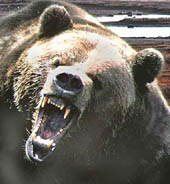A Call To A New Arms Race
 Renewing The Arms Race With Russia
Renewing The Arms Race With Russia
The Sino-Russian U.S rivalry for military supremacy heats up. The Russian Bear has no intention of allowing any nation sole superpower status. It has reaffirmed its commitment to the "god of fortresses" and warned "Comrade Wolf" to beware .
Putin raises spectre of Cold War with threat of arms race
By Nick Allen in Moscow and Alec Russell in Washington(Filed: 11/05/2006)
Vladimir Putin, the Russian president, raised the spectre of the Cold War yesterday, likening the United States to a voracious wolf and declaring that the arms race was not yet over. Vladimir Putin: the arms race ‘is rising to a new technological level’
With relations between Moscow and Washington at their most strained in many years, Mr Putin used his annual state of the nation speech to revive Russia's military rivalry with the United States. "It is premature to speak of the end of the arms race," he said in his televised address to the Russian people. "Moreover, it is going faster today. It is rising to a new technological level." Seeking to portray the United States as Russia's main adversary, Mr Putin pointed out that Moscow's military budget was 25 times lower than Washington's. He said that would have to change if foreign attempts to interfere in Russian policy were to be warded off. "We must always be ready to counter any attempts to pressure Russia," he said. "The stronger our military is, the less temptation there will be to exert such pressure on us." Spending is to increase on both conventional forces and the so-called nuclear triad of land, sea and air-based strategic weapons, he said.Two new nuclear-powered submarines armed with Topol-M intercontinental ballisticmissiles would soon go into service, the first to be built since 1990, Mr Putin noted as one example. Meanwhile the mostly conscript-based army must fill two thirds of its ranks with professionals by 2008. Russia's military will reportedly receive £12.3 billion this year, £2 billion more than in 2005. Mr Putin's annual address is always meticulously dissected by Kremlinologists seeking clues for Russia's direction over the coming 12 months. This year's speech comes just six days after Dick Cheney, the US vice-president, accused the Kremlin of backsliding on democracy and blackmailing its neighbours in one of the most scathing attacks on Russia since the collapse of the Soviet Union. The Russian press compared Mr Cheney's criticisms to Winston Churchill's "Iron Curtain" speech in 1946 and said it heralded the dawn of a new Cold War. Mr Putin's trenchant remarks went down badly in Washington, where officials also expressed their concern with Moscow's stance over Iran's nuclear program. Russia, backed by China, is blocking any chance of agreement on a resolution on Iran, arguing that a text proposed by western powers could be interpreted as the first step towards military action. American officials were bridling over the uncompromising attitude of Russia's foreign minister, Sergei Lavrov, at Monday night's critical and unsuccessful talks in New York between Condoleezza Rice, the US secretary of state, and the foreign ministers of Germany, France, Britain, Russia and China. In a sign of the rising political pressure over Russia, Senator John McCain, the Republican front-runner to succeed George W Bush in the White House, launched a broadside against the Kremlin. "There has been a steady retrogression and a sort of an effort to restore the old Soviet Empire," he told CBS television. The Russian leader accused the Bush administration of sacrificing the democratic ideals it claimed to cherish when they conflicted with national self-interest. "Where is all this pathos about protecting human rights and democracy when it comes to the need to pursue their own interests? Here, it seems, everything is allowed and there are no restrictions whatsoever. "We are aware of what is going on in the world. Comrade Wolf knows whom to eat, he eats without listening and he's clearly not going to listen to anyone." But he stressed that Russia's foreign policy was based on "pragmatism, predictability and observance of international law".
http://www.telegraph.co.uk/news/main.jhtml?xml=/news/2006/05/11/wputin11.xml&sSheet=/news/2006/05/11/ixnews.html





